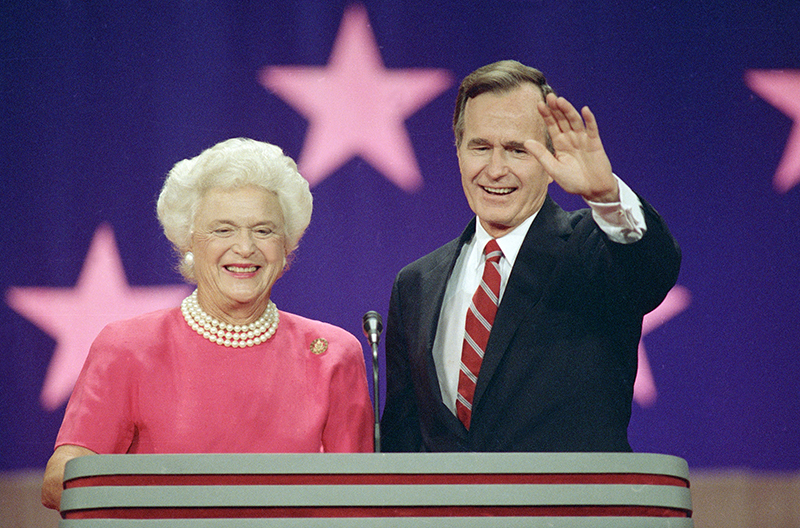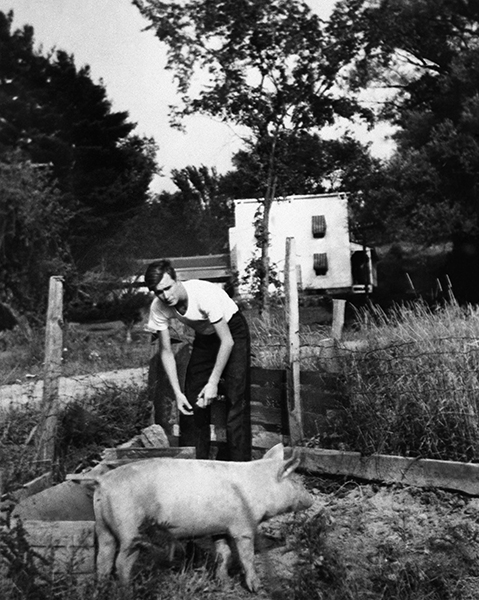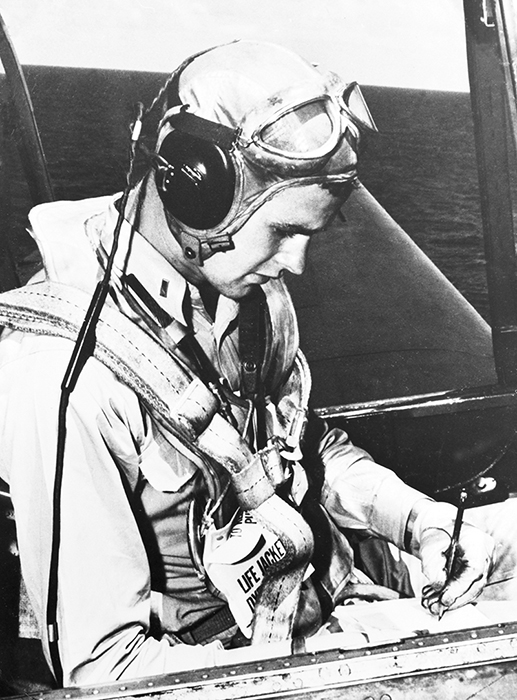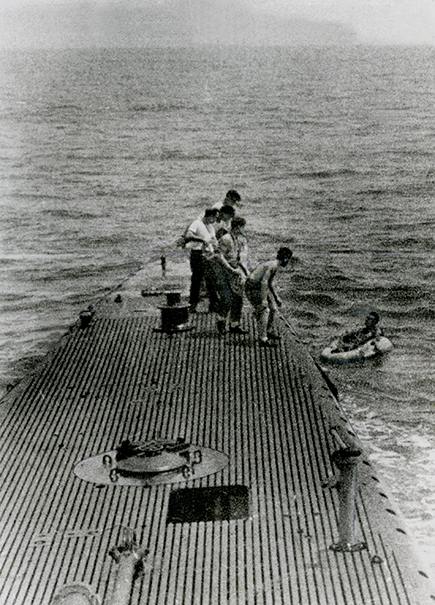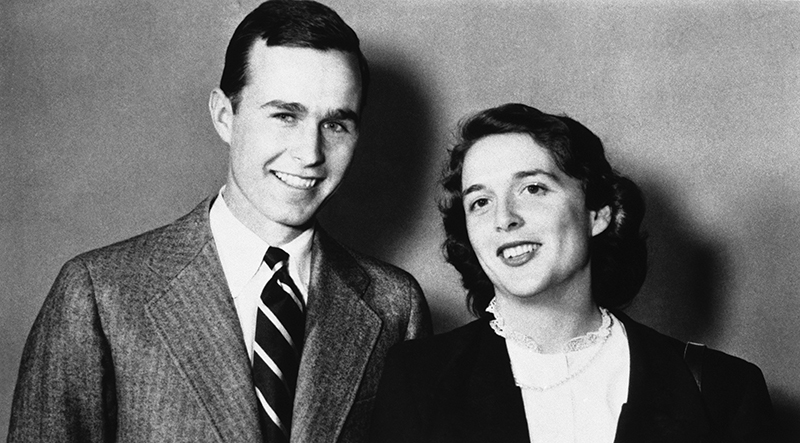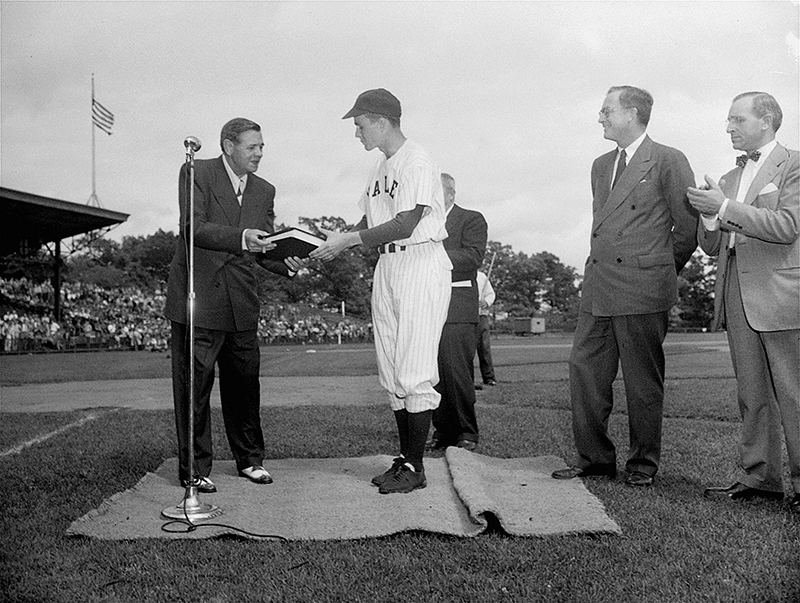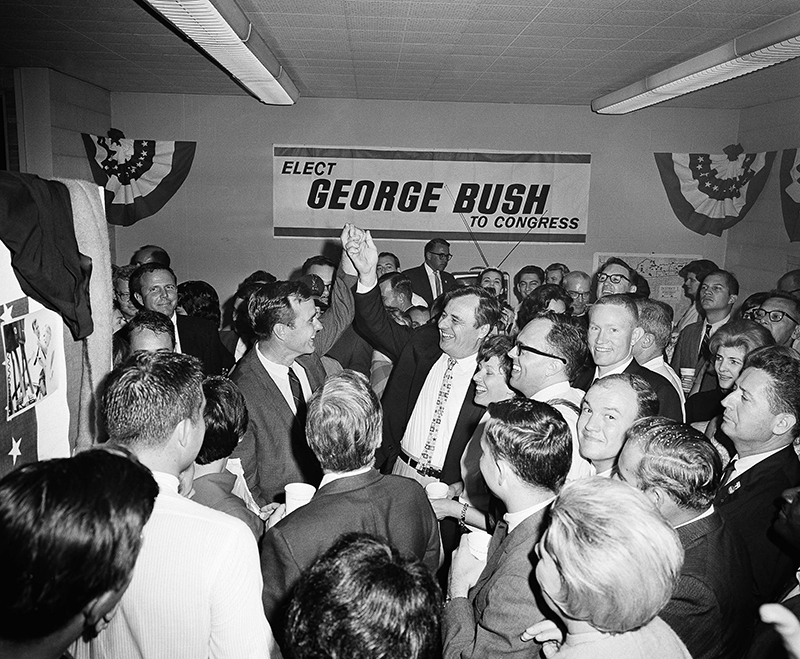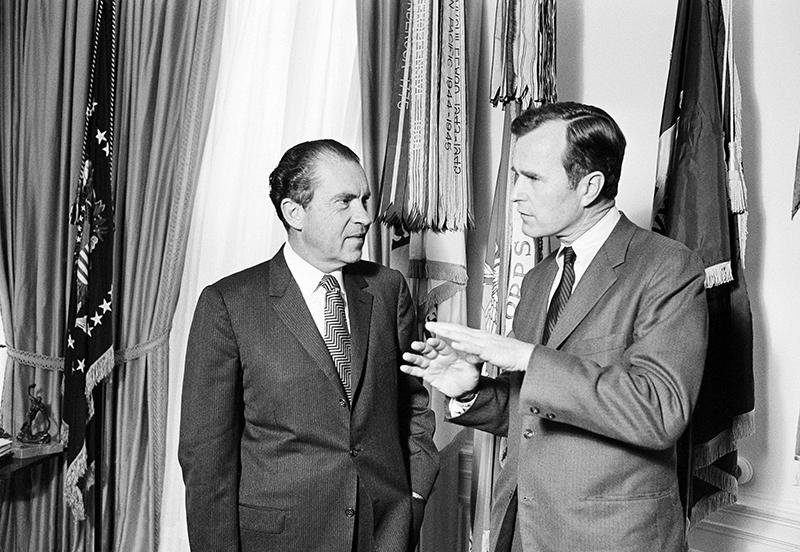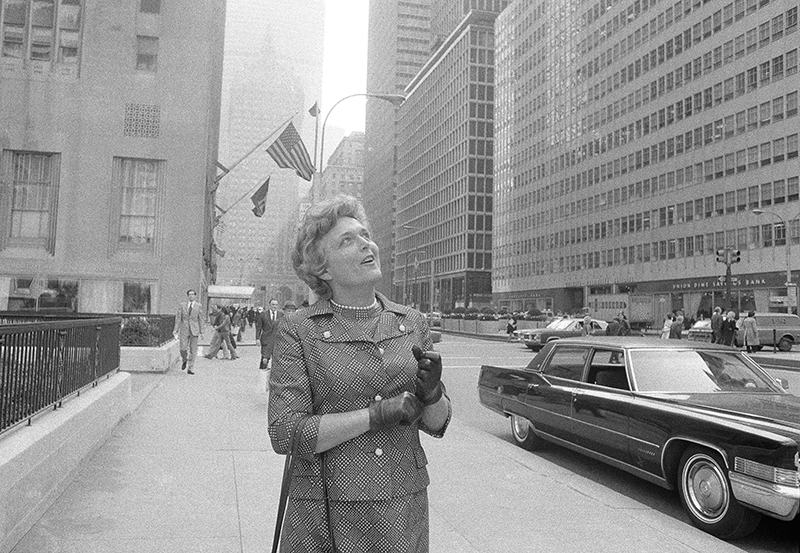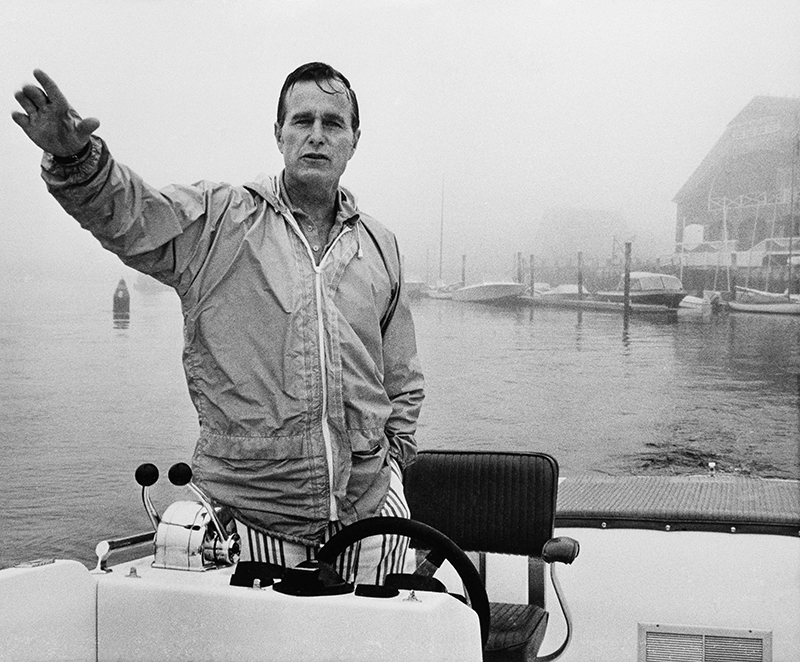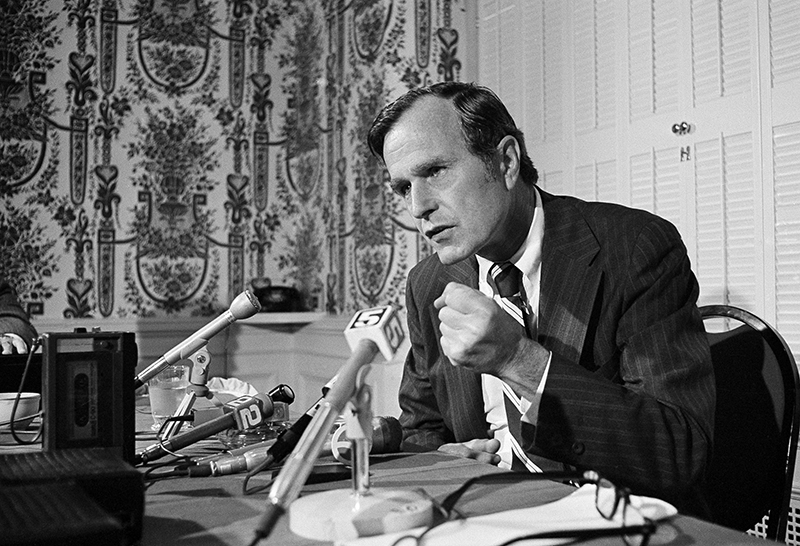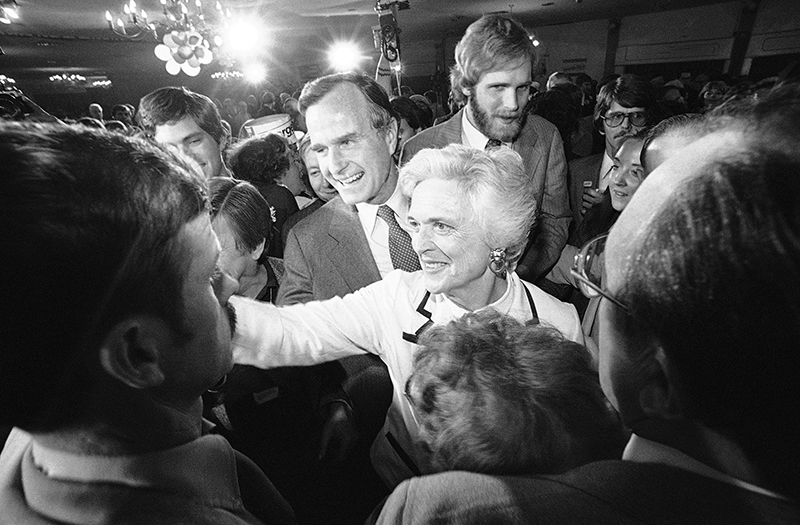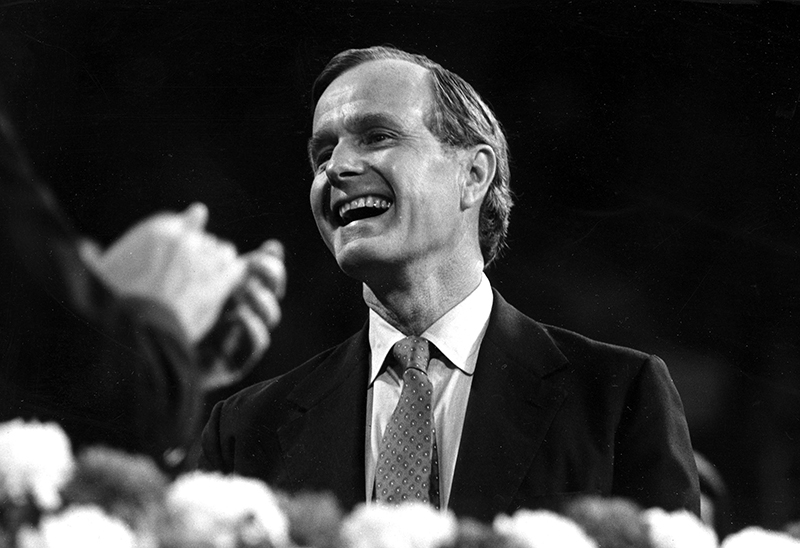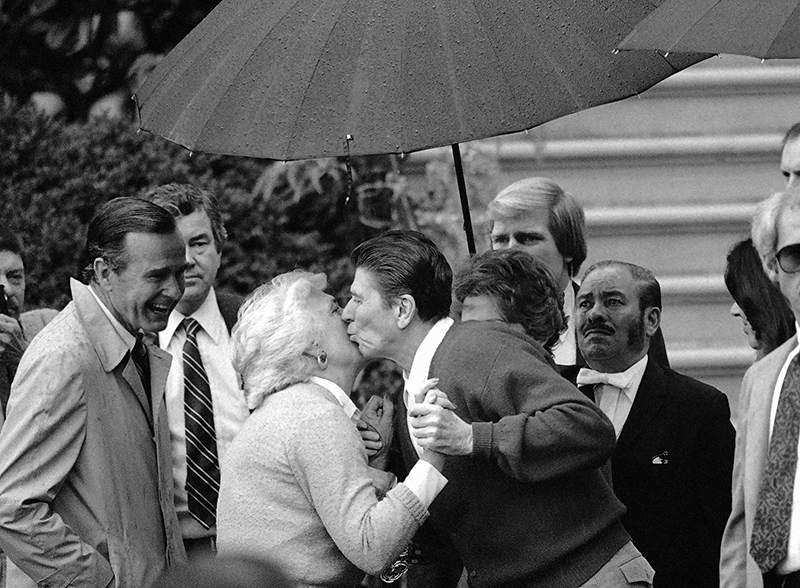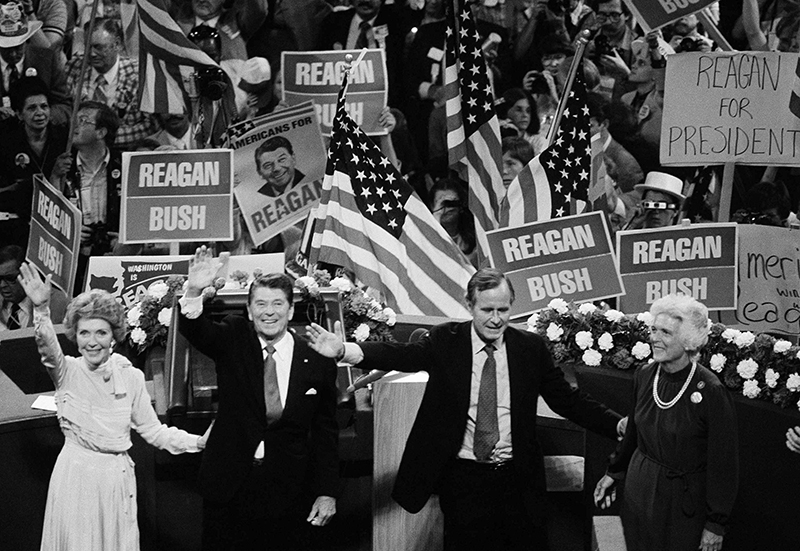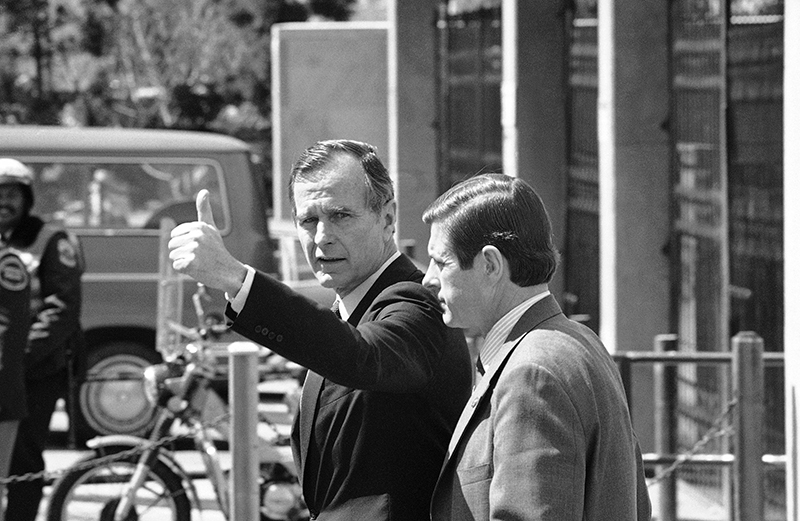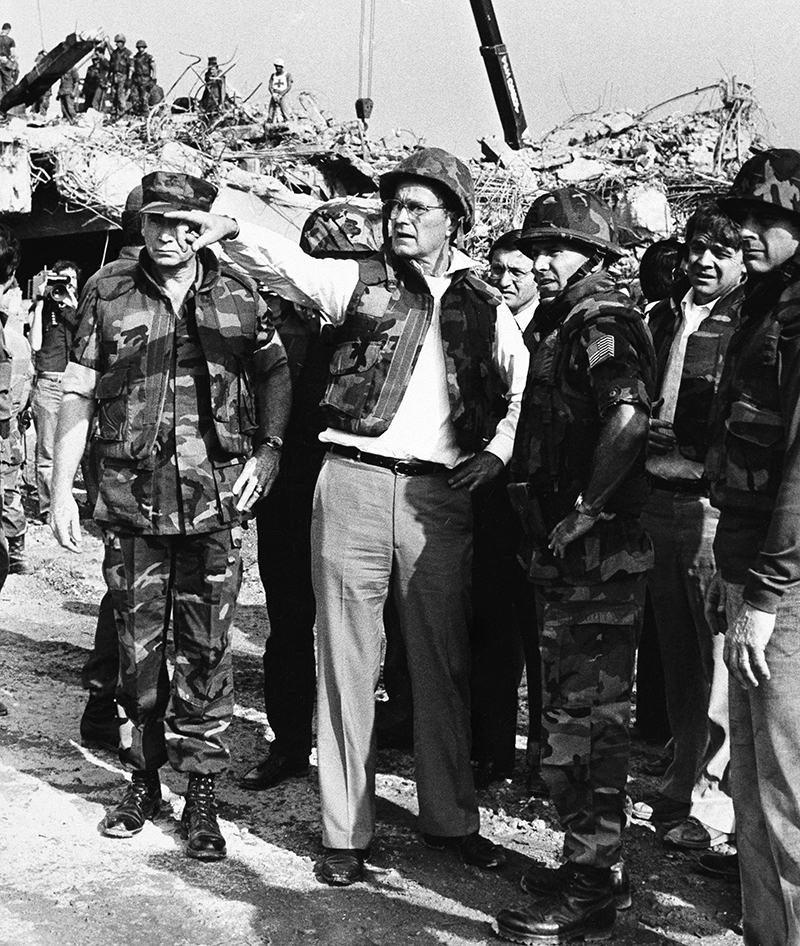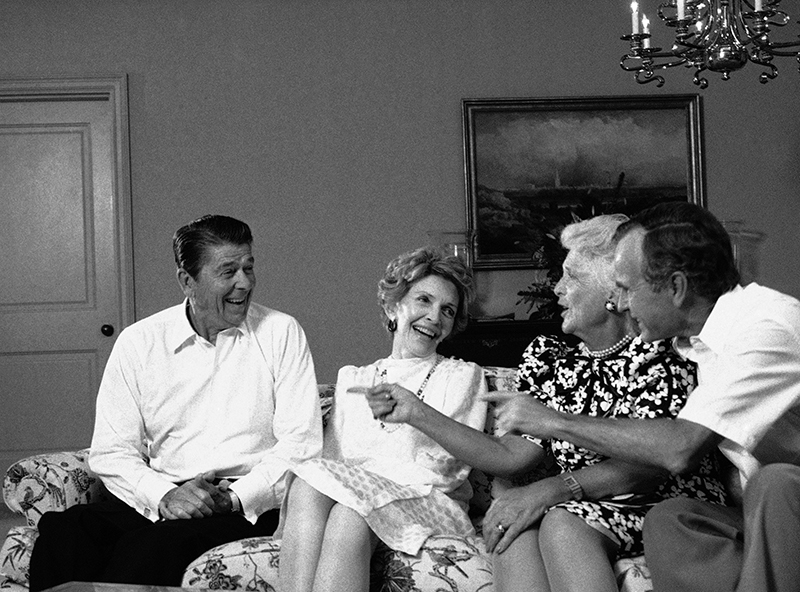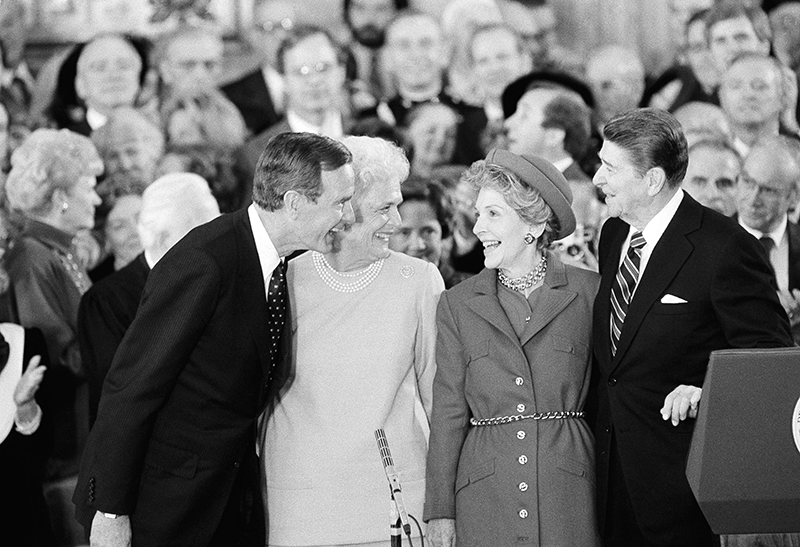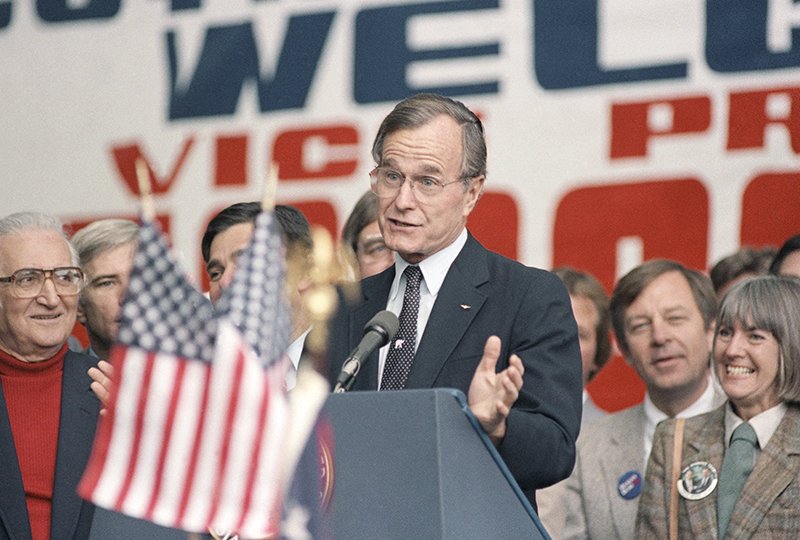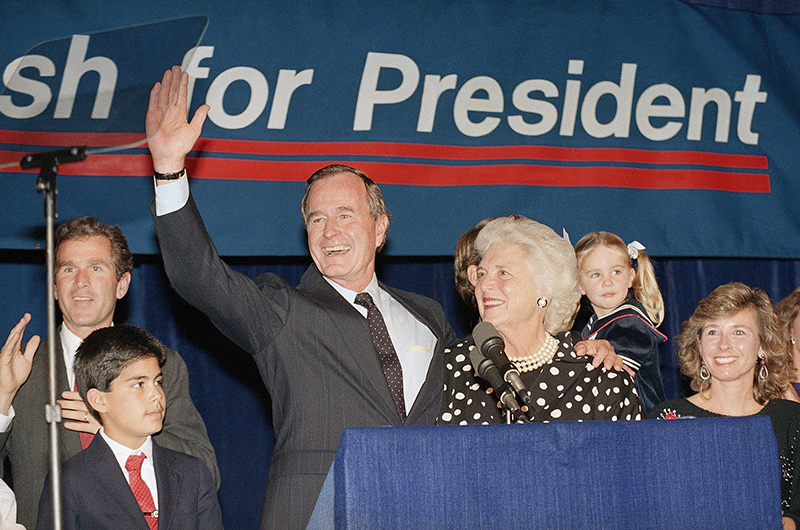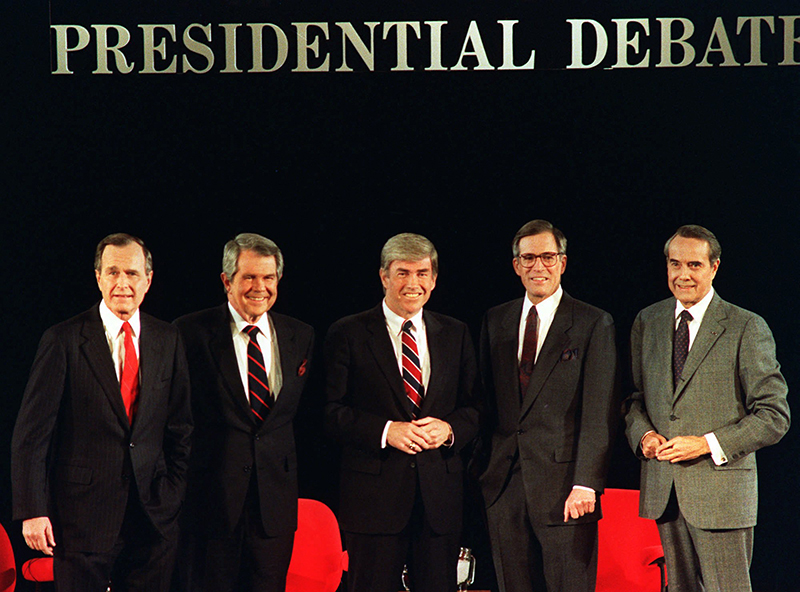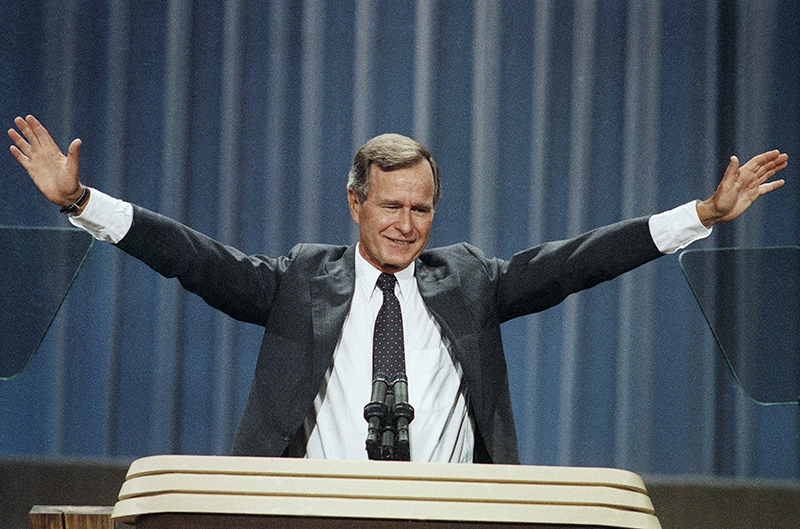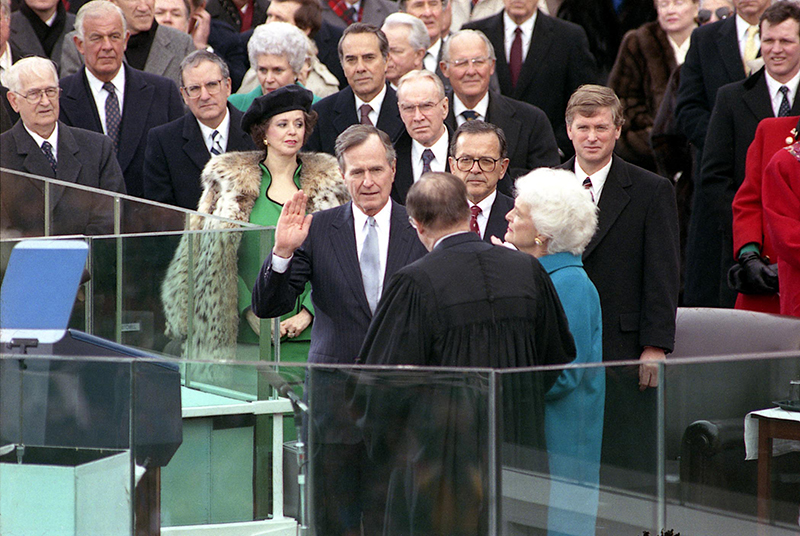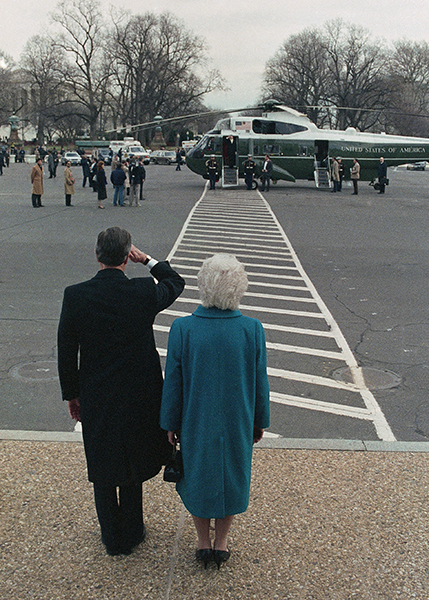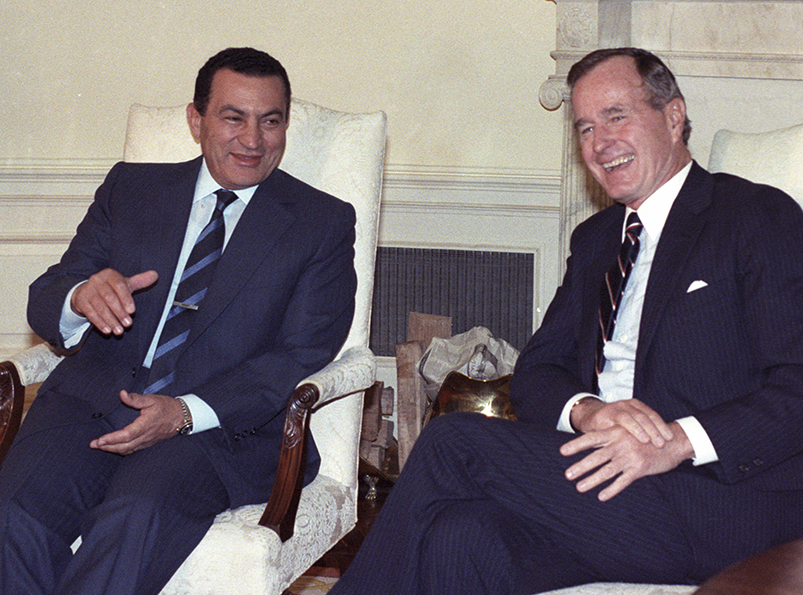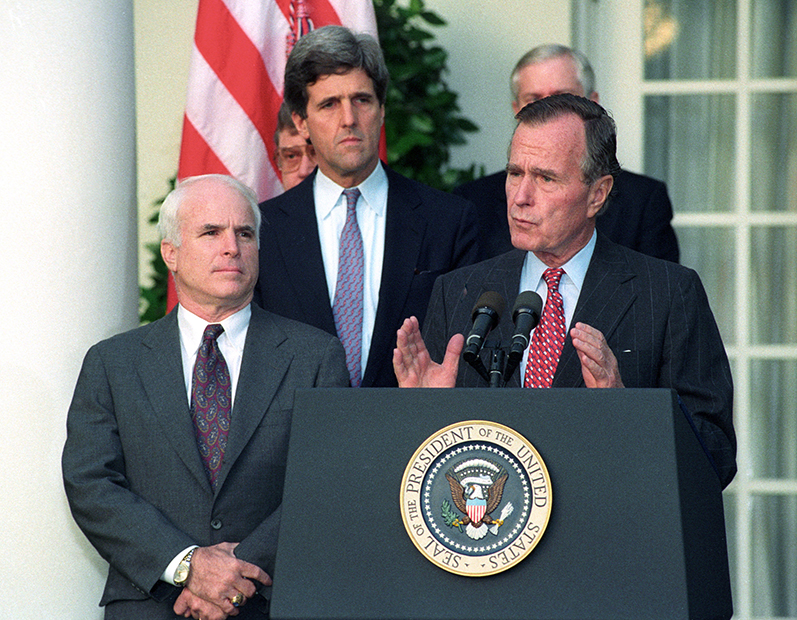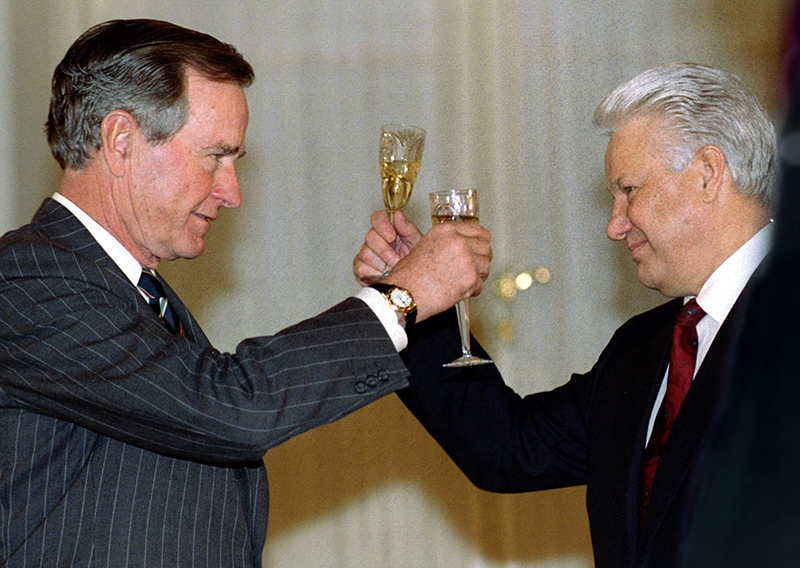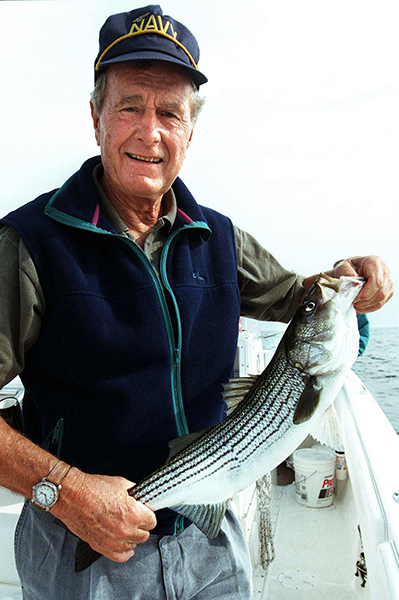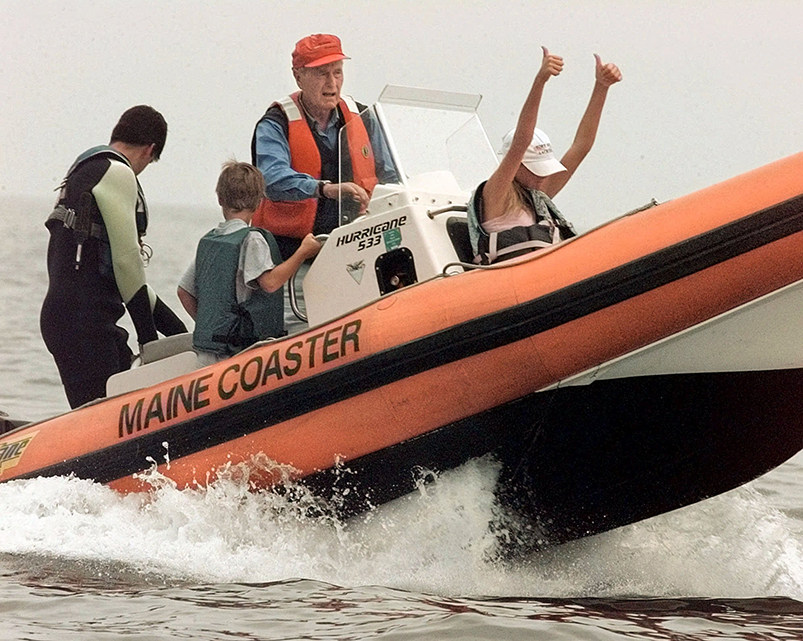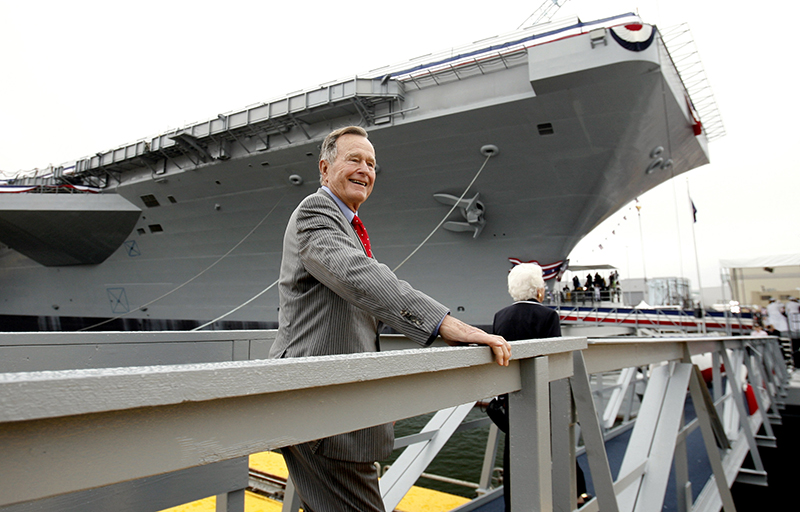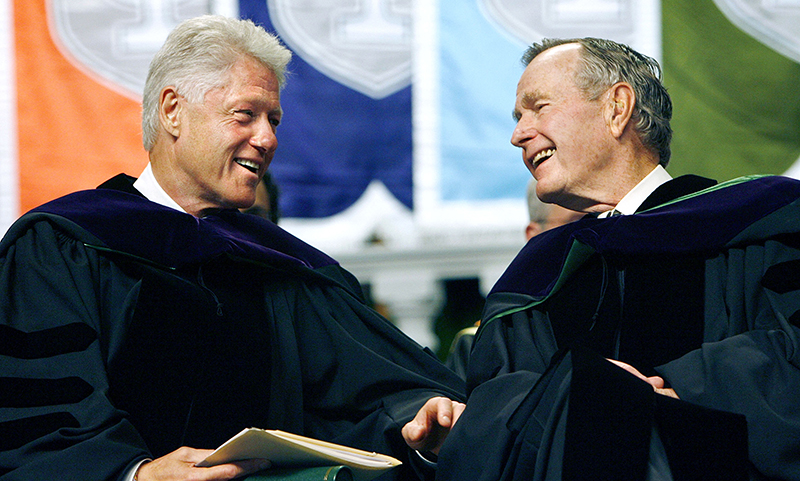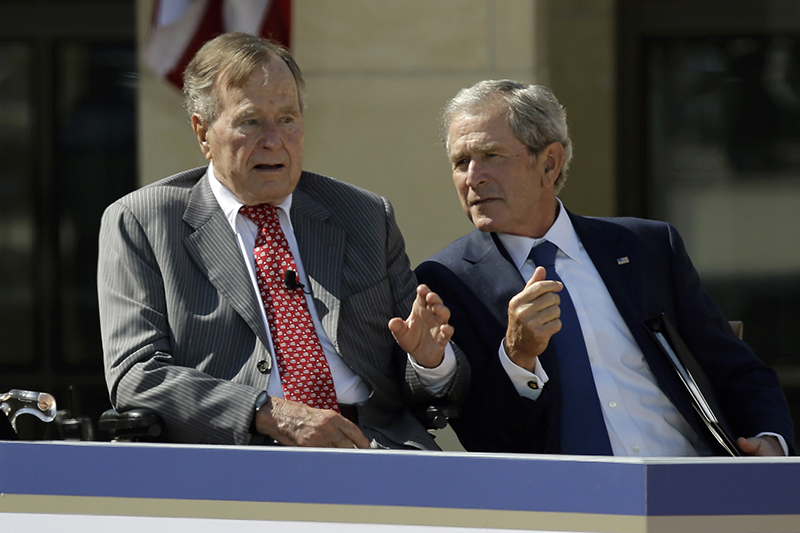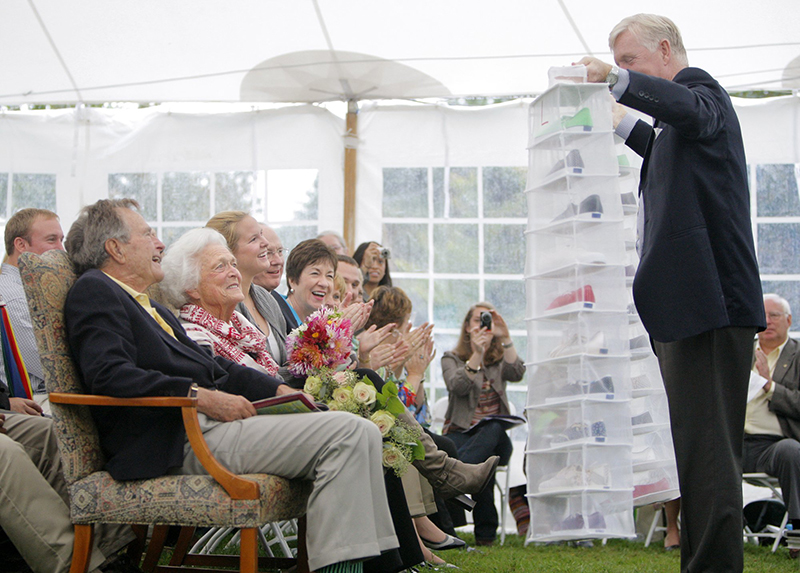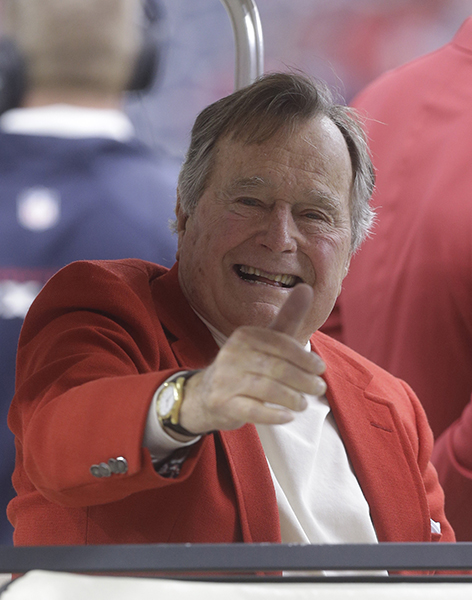KENNEBUNKPORT — On an August day in 1921, the boats began arriving here at St. Ann’s by the Sea, a bucolic Episcopal summer chapel surrounded by lush gardens on Kennebunkport’s Atlantic shore. Unbeknownst to those gathered, they were witnessing the forging of the most successful political dynasty in American history.
Herbert Walker, an aggressive and fabulously wealthy investment banker whose shingled summer compound occupied an 11-acre peninsula nearby, led his daughter Dorothy to the altar. There, future U.S. Sen. Prescott Bush, the 6-foot-4 descendant of Episcopal ministers and heir to a small fortune himself, stood waiting.
The match united the aristocratic, risk-taking Walkers with the cautious, understated Bushes, forging a cohesive, well-connected and fiercely loyal clan whose members would launch their own into the highest offices of the world’s most powerful country, shaping the trajectory of world events and the lives of billions.
Their second child, George Herbert Walker Bush – the son who realized the family’s potential, building and maintaining the alliances necessary to guide himself and one of his sons to the highest office in the land, becoming its 41st president – died late Friday night in Houston at the age of 94, less than eight months after the death of his wife, Barbara.
“George H. W. Bush was a man of the highest character and the best dad a son or daughter could ask for,” his eldest son, former president George W. Bush, said in a statement. “The entire Bush family is deeply grateful for 41’s life and love, for the compassion of those who have cared and prayed for Dad, and for the condolences of our friends and fellow citizens.”
Testimonials quickly poured in from around the world as news of the former president’s death spread.
“The legacy of George H.W. Bush will be forever etched in the history of America and the world,” said James A. Baker III, who served as secretary of state in the Bush administration. “It is a lifelong record of selfless patriotic service to our nation.”
“Hillary and I mourn the passing of President George H.W. Bush, and give thanks for his great long life of service, love and friendship,” former President Bill Clinton posted on Twitter. “I am grateful for every minute I spent with him and will always hold our friendship as one of my life’s greatest gifts.”
Hillary and I mourn the passing of President George H. W. Bush, and give thanks for his great long life of service, love and friendship. I am grateful for every minute I spent with him and will always hold our friendship as one of my life’s greatest gifts. https://t.co/1CYdrIeKmz
— Bill Clinton (@BillClinton) December 1, 2018
Though he was born in Massachusetts and lived in many locations, Kennebunkport and the family retreat on Walker’s Point would remain a constant in George H.W. Bush’s life, the touchstone of his growing family, a venue for some world-shaping events of his presidency, and the nearest thing he had to a permanent home.
A CONSERVATIVE MODERATE
Bush was a conservative of a variety now all but extinct in American politics, an admirer of the 18th-century Irish political philosopher Edmund Burke, who championed prudence, held radical change deeply suspect, and believed voters elected their representatives for their good judgment rather than compliance with their immediate concerns. “George Bush was a Burkean conservative with the heart and soul of a moderate,” biographer Herbert Parmet wrote, “a conservative moderate rather than a moderate conservative.”
Statement of James A. Baker, III, on the passing of George H.W. Bush. https://t.co/gLMaWz3j82
— Baker Institute (@BakerInstitute) December 1, 2018
Although he was elected to the country’s highest office, Bush disliked campaigning and wasn’t particularly gifted at it. He rose politically through a series of appointed positions: chairman of the Republican National Committee, ambassador to the United Nations, envoy to the People’s Republic of China and director of the Central Intelligence Agency. He was a relationship builder and diplomat, substantially expanding the social networks he inherited and relying on his friendships and personal relationships rather than what he once famously derided as “the vision thing.”
He was the last president cast from the old “Northeastern establishment” mold, projecting a patrician public image of dignity and self-effacement rather than a firebrand or an accessible everyman. “At the time, (Bush’s style) didn’t seem to be leadership qualities to the public. Some even saw it as weakness,” Bush’s former national security spokesman Roman Popadiuk told Newsweek in 2011. “But now people are looking back … and they’re appreciating how he hearkened back to an era in which people were treated with respect and in which politics had some civility.”
TWO POWERFUL FAMILIES
George Herbert Walker Bush was born June 12, 1924, in Milton, Massachusetts, a few miles from the rubber flooring firm where his father worked. Although his parents lived modestly, they both were heirs to considerable fortunes and powerful family alliances built up over generations.
George’s maternal grandfather, investment banker Herbert Walker, was an ostentatious risk taker who forced his sons to settle disputes by boxing one another – and later himself – without gloves or rules. (A golf enthusiast, he endowed the Walker Cup.) He purchased the property now called Walker’s Point in 1902 – it had previously been used as a public park – and also had a former slave plantation in South Carolina, a home on Long Island, two Rolls-Royces and a pair of personal butlers. Herbert would support his grandson’s business and political ambitions throughout his life. When Herbert was on his deathbed, George wrote him a letter crediting him with teaching him “what loyalty was all about” and acknowledging that he had “handed me the future and made my life sing.”

A flag at half-staff honoring President George H.W. Bush at Walker’s Point in Kennebunkport the morning after his death at 94.
By contrast, Bush’s father, future US Senator Prescott Bush, and grandfather, Samuel Bush, were affable, polite, frugal and cautious. Samuel had been president of Columbus-based Buckeye Steel, nursing the troubled firm back to prosperity and earning considerable wealth and the gratitude of its owner, John D. Rockefeller’s brother Franklin, in the process. They did not flaunt their riches; at Yale, Prescott would pass himself off as a middle-class student and later campaigned for the U.S. Senate as the son of a man of “modest income.”
“For the Bushes … pleasures were sought and valued but could not be allowed to intrude upon the serious affairs of life,” biographers Peter and Rochelle Schweizer wrote. “For the Walkers, pleasures were the serious things of life.”
One thing the families shared was a belief that each family member should go out into the world and earn his own fortune, even if assisted along the way by their connections. Accordingly, Herbert Walker spurned a position at the family business, the largest dry goods wholesaler in the Midwest, to instead found his own investment bank, but this venture succeeded because he was able to ally himself with the sons of his father’s business partner, E.H. Harriman, president of the all-powerful Union Pacific Railroad. Prescott Bush, after working for a time as a hardware salesman, was hired by the firm, working under his father-in-law and alongside the Harriman boys, one of whom was a friend and classmate of his from Yale. The Harrimans later helped underwrite Prescott’s runs for U.S. Senate, where he represented Connecticut from 1952 to 1963.
America has lost a patriot and humble servant in George Herbert Walker Bush. While our hearts are heavy today, they are also filled with gratitude. Our thoughts are with the entire Bush family tonight – and all who were inspired by George and Barbara’s example. pic.twitter.com/g9OUPu2pjY
— Barack Obama (@BarackObama) December 1, 2018
Similarly, George H.W. Bush set out and made his own fortune in the oil business in Texas, but did so with capital provided by his father, his uncle Herbert, and one of his father’s business partners and Yale classmate, Neil Mallon. Later, the family network also helped line up initial investors for his son George W. Bush, when he started drilling for oil, with uncles Jonathan Bush and Scott Pierce lining up deep-pocketed partners. “My father’s name helped me attract early investors for my business,” George H.W. Bush told The Washington Post in 1999. “If my name did the same for ‘W,’ great!”
“While they are certainly more self-made than the Kennedys and have a strong drive to prove their worth,” the Schweizers noted in “The Bushes: Portrait of a Dynasty,” “family members don’t think twice about going to family and friends in their climb to the top.”

P24216-05A President Bush with his Springer Spaniel, Ranger, on the rocks outside their home on Walker’s Point, Kennebunkport, ME, 10 Aug 91. Photo Credit: George Bush Presidential Library and Museum
FROM SCHOOL TO WAR AND BACK AGAIN
George H.W. Bush started with many advantages. He grew up in Greenwich, Connecticut, one of the wealthiest communities in the country, and attended the elite Greenwich Country Day School, Phillips Andover Academy and, ultimately, Yale, from which his father, great-grandfather and his eldest son graduated. He spent every summer at Walker’s Point and met his future wife, Barbara Pierce, at a formal country club dance when he was 17 and she 16.
On graduating from Andover in June 1942, Bush was expected to enroll at Yale but instead enlisted in the Navy, becoming its youngest aviator at age 18. He and Barbara were secretly engaged during a moonlit walk on the shores of Kennebunkport days before he shipped out to fight the Japanese.
Bush flew TBF Avenger torpedo bombers on 58 combat missions from the escort carrier USS San Jacinto and was shot down twice, and the second time was the only member of the three-man crew to survive. Although eligible to rotate back to the United States, he flew eight additional missions over the Philippines, earning three Air Medals and a Distinguished Flying Cross. He rarely spoke of his wartime experiences.
He and Barbara corresponded throughout his combat tour – Bush nicknamed his planes after her – and they were married in Barbara’s hometown of Rye, New York, in January 1945, just two weeks after he had returned home. The war ended that summer, and George enrolled at Yale.
Bush graduated in just two and a half years, during which time he became a father, played on two NCAA national championship baseball teams and was inducted into Skull and Bones, the storied secret society to which his father had belonged. He majored in business and economics, and upon graduation piled Barbara and young George W. into their car and drove to Odessa, Texas, seeking their fortune in the oil fields.
A CONNECTICUT YANKEE IN TEXAS
Bush initially worked for Dresser Industries, a drilling equipment company run by his father’s friend, Neil Mallon, where he worked as an equipment clerk and lived in a duplex where his family shared a bathroom with a mother-and-daughter prostitution team. After a few months he was transferred to California (as a drill bit salesman) and, in 1950, to Midland, Texas, where he started his own oil rights trading business with his father’s and uncle’s backing.
Three of their six children were born in Midland, a booming oil patch town Bush would later describe as “Yuppieland West” on account of the large number of fellow Ivy League Easterners who’d moved there and made up the membership of the two country clubs. George W. and his brother Jeb attended Midland’s public elementary and middle schools, though both would later follow their father’s path to Andover and Yale.
Bush worked long hours, particularly after founding his own oil drilling firm, Zapata Petroleum, in 1953. Barbara raised the children and maintained the home and a growing card catalog of the family’s friends, acquaintances and business partners which would later support her husband’s and sons’ political aspirations.
— The Carter Center (@CarterCenter) December 1, 2018
Tragedy also struck in 1953. Their 4-year-old daughter, Robin, developed leukemia and, despite treatment in New York, died a few months later. The family has said Bush was unable to speak of his daughter’s death for 40 years; he immersed himself in work, flying around the world, negotiating offshore oil deals for Zapata.
As his company grew, stationing multimillion-dollar oil rigs off Texas and Cuba, Bush moved it and his family to Houston, where he began his first forays into politics.
Bush’s father had been what would today be thought of as a moderate Republican, pro-business and fiscally conservative but also a champion of civil rights and an active supporter of the NAACP. George, like later presidential aspirant Mitt Romney, was a bit harder to pin down. In some contexts he appeared a mirror image of Prescott Bush: a Northeastern moderate in the vein of Nelson Rockefeller or Margaret Chase Smith; at other times in his career he embraced positions much further to the right and in 1964 would enthusiastically support conservative Barry Goldwater over Rockefeller for the Republican nomination. Although he would loyally serve two conservative presidents from outside the “Eastern establishment,” Richard Nixon and Ronald Reagan, he never earned the trust of his party’s conservative wing, including the anti-Communist John Birch Society.
While still with Zapata, Bush became party chairman for Harris County, which included metropolitan Houston, a position he held for much of 1963 and early 1964.
“Bush proved a roaring success, the hardest working chairman Harris County Republicans had ever seen,” retired New York Times reporter Tom Wicker wrote in his eponymous 2004 biography. “Everything Chairman Bush touched seemed to succeed – except that he could never win the Birchers’ friendship, hard as he tried, not even when he named some of them to leadership positions in the county. He was too eastern, too Yale, too moderate, the epitome of everything Barry Goldwater was not – or so the Birchers were convinced.”
He stepped down in 1964 and ran for his first elected office: the United States Senate. His opponent was first-term incumbent Ralph Yarborough, a liberal Democrat whose support of integration, endangered species and civil rights made him vulnerable in Texas. Bush attacked him for voting in favor of that year’s Civil Rights Act and cast himself as a right-wing conservative, denouncing the United Nations, affirmative action, President Lyndon Johnson’s “soft” strategy in Vietnam, and the nuclear test ban treaty. Goldwater and Nixon stumped for him, even as conservatives denounced him as a tool of “Liberal Eastern Kingmakers.”
Bush won the primary but lost the general election by eight points after Yarborough labeled him a “carpetbagger from Connecticut who is drilling oil for the sheik of Kuwait” with his “four wives and 100 concubines.” Bush took the loss hard and regretted some of his stances. “I took some far-right positions to get elected,” he later recalled telling his minister. “I hope I never do it again.”
MR. BUSH GOES TO WASHINGTON
But Texas was rapidly growing, and in 1966 a new congressional district was created encompassing the wealthier sections of Houston where he was popular and well known. He sold his stake in Zapata for $1.1 million and jumped into the race as a mainstream Texas conservative: supportive of the Vietnam War, lower taxes and “right to work” laws. He won with nearly 58 percent of the vote. He and Barbara moved to the Washington area, which would serve as their primary residence for most of the next quarter century.
In Congress, Bush became the first freshman member of the powerful Ways and Means Committee since 1900, the result of his father’s lobbying. “Otherwise his first term was undistinguished except for his typically hard work for his constituents and his assiduous courting of even the least among them,” Wicker wrote. “The name cards kept piling up in Barbara’s files.” He ran unopposed in 1968, despite supporting a law unpopular in Texas that prohibited racial discrimination in housing. In his second term, he championed family planning and, in 1970, co-sponsored federal legislation to support family planning clinics.
One day in May 1969, Bush’s phone rang. It was the White House. Nixon wanted to see him immediately. Shortly thereafter in the Oval Office, the president asked Bush to take a risk on his behalf. Nixon was desperate to retake control of the Senate and wanted Bush to make another run at Sen. Yarborough’s seat. He pledged to actively support Bush’s campaign and, if it failed, to provide a “soft landing.” Bush ultimately agreed, giving up a safe House seat for an uncertain Senate bid.
Despite Nixon’s support, Bush’s 1970 effort failed, largely because Yarborough lost the primary and Bush found himself up against Lloyd Bentsen, a conservative Democrat. Nixon, true to his word, found him a job as U.S. ambassador to the United Nations, where he’d serve from 1971 to January 1973. Thereafter, Nixon tapped him to be chairman of the Republican National Committee.
Bush headed the RNC as Watergate raged, and remained loyal to the president, apparently believing him innocent. He and Barbara soon found themselves socially isolated, even among congressional Republicans. According to the Schweizers, only after the release of Nixon’s secretly recorded tapes – which showed the president had been involved in the Watergate burglary cover-up – did Bush realize “that Nixon had lied to just about everyone, including him.”

Barbara Bush holds the Bible as George H.W. Bush is sworn in as the new director of the Central Intelligence Agency by Supreme Court Associate Justice Potter Stewart at CIA headquarters in Langley, Virginia, on Jan. 30, 1976. At right is President Gerald Ford.
PURSUING ‘A POLITICAL BIRTHRIGHT’
After Nixon’s resignation, Bush had reason to hope that he might become vice president, but President Gerald Ford appointed him envoy to the People’s Republic of China instead. Biographers describe the 14 months they spent in Beijing as a quiet interlude for George and Barbara, with fewer family and professional responsibilities, but after a year, Bush wrote Ford asking for a stateside appointment.
To his surprise and consternation, he was asked to head the CIA, which, in his own words, was being investigated for everything “from lawbreaking to simple incompetence.” To make matters worse, a Senate committee insisted Ford exclude Bush from consideration as his 1976 running mate to win their confirmation. (Sen. Bob Dole would take that role instead.) Bush sat out the election, upset at having, as he put it, “been asked to renounce his political birthright” to take an office the president had asked him to fill. Ford would lose to Carter in 1976, ending Bush’s two-year tenure at the CIA.
George and Barbara returned to Texas, bought a Houston home and, after his uncle Herbert Walker Jr.’s death in 1977, the Walker’s Point property in Kennebunkport. The purchase was a stretch for George, as he had to match the offer his mother received from Arab investors seeking to build condos there. But the property meant a great deal to him. His mother had been born on the property, his parents had held their wedding reception there, and George had spent almost every summer there, including the one in which he learned to walk. “Maine is for us like a magnet,” he wrote a friend in this period. “We are drawn to it, and I want that to be that way for all our kids, forever.” He and Barbara resided there every summer thereafter.
Meanwhile, the couple had been laying the groundwork for an even more ambitious project: George’s 1980 bid for the presidency. He paved the way by traveling the country giving hundreds of speeches extolling mainstream conservative positions: free markets, free trade, lower taxes and fewer regulations. But he also supported the Equal Rights Amendment and women’s right to choose to end a pregnancy where state law allowed for it, which fueled right-wing suspicion that he was really a closet liberal. In contrast to his 1964 Senate bid, in 1980 Bush emphasized his moderation, not his conservatism, thinking that most Republicans would be uncomfortable with the conservative alternative that year, actor and former California governor Ronald Reagan. He dismissed Reagan’s supply-side economic theories as “voodoo economics.”
He was wrong, of course; Reagan had an enormous following. While Bush managed to win his party’s Iowa caucus, Reagan destroyed him in New Hampshire and went on to win the White House.
For Bush, there was a silver lining. Reagan, feeling he needed the reassuring presence of a vice president from his party’s mainstream, intended to nominate President Ford. But when that fell apart – Ford’s remarks to the press suggested he expected something akin to a co-presidency – Reagan tapped Bush instead.
As vice president, Bush was assiduously loyal to Reagan, never expressing differences with him in public or even in Cabinet meetings. “It is an absolute determination not to express myself,” he would later say. “I don’t think the president should ever have to choose between me and a Cabinet member. That’s not the way to have a relationship of confidence.” His candid thoughts were shared only during his weekly luncheons with the president, from which no information ever leaked, according to Schweizer and Schweizer.
“Don’t expect me to make policy,” he told an aide early on. “(M)y job is to cement my relationship with Ronald Reagan and articulate his policies.”
While Bush’s commitment to being a team player did foster a warm relationship with the president, biographers have written of his tensions with first lady Nancy Reagan, who spread rumors that Bush was having an affair with the widow of a former congressman.
In 1986 the Reagan administration was shaken by the revelation that it had sold arms to Iran in order to secure the release of American hostages, with most of the proceeds being diverted to the Contras, a rebel group seeking to overthrow Nicaragua’s communist government. The program violated both an arms embargo in Iran and a 1982 law forbidding support for the Contras. Documents showed Bush was present at several key meetings where the sales to Iran were discussed, a fact his opponents used against him in his 1988 presidential run.
TO THE OVAL OFFICE
Polls showed the Iran-Contra scandal was hurting Bush’s primary campaign, contributing to his early and unexpected loss in Iowa, where he finished behind both Bob Dole and televangelist Pat Robertson. But he came back in New Hampshire – Goldwater flew in to proclaim him the heir to the “conservative revolution” begun in 1964 – and soon wrapped up his party’s nomination.
He started the general election campaign with a polling deficit as well, with far higher negatives than his little-known Democratic opponent, Massachusetts Gov. Michael Dukakis. Bush’s campaign staff – which included future Fox News head Roger Ailes and the formidable strategist Lee Atwater – persuaded him to go negative, redefining the race in terms of values rather than issues. The most effective ads – one produced by the campaign, another by a political action committee – took Dukakis to task for vetoing restrictions on a weekend furlough program for convicted murderers, some of whom – including a felon named Willie Horton – committed rapes or murders while free. Other ads focused on Dukakis’ opposition to a law requiring students to say the Pledge of Allegiance, and poor water quality in Boston Harbor. Bush rallied conservatives with a famous “read my lips” pledge not to raise taxes.
Bush won the general election in a landslide, capturing 40 states. He would serve a single term.
Bush had positioned himself as the heir to Reagan’s legacy, and appears to have seen himself as a capable steward of the nation, rather than the agent of substantive change. On the eve of Bush’s inauguration, conservative writer William F. Buckley described him as “a consolidator” rather than “an evangelist,” “a man of intelligence and common sense, a public man of conservative temperament” rather than a movement conservative. Biographers Schweizer and Schweizer wrote that Bush had “arrived in the White House with no clear vision of the direction he wanted to take.”
Commentators noted that Bush’s self-effacing qualities – so valuable in diplomacy or personal negotiation – may have undermined his standing in the public eye. When the Berlin Wall fell – perhaps the greatest historical event of the second half of the 20th century – Bush resisted his aides’ calls to make rousing speeches to take credit for what many saw as a triumphant American victory in the Cold War. This was certainly consistent with his personality, but Bush may have had broader national and international interests in mind. In 2011, Newsweek reported that unnamed Bush aides had confirmed that Bush had received a secret cable from Soviet leader Mikhail Gorbachev the night the wall fell, urging him not to take any actions that might provoke protests or confrontation at what was an extremely delicate moment. Bush reportedly agreed, suggesting he may have put global security interests ahead of personal political ones.

In this July 4, 1991, photo, President George Bush congratulates Gen. Norman Schwarzkopf after presenting him the medal of freedom at the White House in Washington. Schwarzkopf died Thursday in Tampa, Fla. He was 78.
BUSH AT WAR
Instead, history will likely remember his presidency for the 1991 Gulf War, in which Bush built and deployed an international coalition that reversed Iraqi dictator Saddam Hussein’s invasion of Kuwait. Many of the key meetings with security advisers and heads of state were held in Kennebunkport that August. Victory came faster than anyone had expected. In the wake of the conflict, polls put Bush’s approval rating at 90 percent.
Outwardly, re-election seemed assured, but behind the scenes Bush was in a funk and suffering from an overactive thyroid and the side effects of the medications that helped manage the condition. His son Neil was embroiled in the ongoing savings and loan scandal for his role in a billion-dollar bank collapse. Conservative Republicans were furious with him for breaking his “read my lips” pledge by raising taxes to balance the budget. The economy was in recession. His polling numbers were fast eroding.
“(W)hat happens if we should not make it?” Bush wrote in his diary in early September of that year. “Then I said to myself, it’s not going to happen. I’m a better person, better qualified, and better character to be President, despite some shortcomings I may have. … Everything is ugly and everything is nasty. But we are a family and I have a certain inner peace, which I’m not sure I’ve ever had in a situation like this.”
In November 1992 Bush lost the presidency to former Arkansas Gov. Bill Clinton in a three-way race that featured Texas businessman Ross Perot. “George Bush says (we lost) because he didn’t communicate as well as his predecessor or successor,” Barbara would later write. “I don’t believe that.” Both she and George complained of what they saw as biased treatment in the press, with George noting his frustration at having his character distorted.
Bush’s political career was over, but his dynasty was just beginning. By the end of 1993, son Jeb announced he was going to run for governor of Florida (a move expected and praised by his parents) and son George W. said he wanted to be governor of Texas (which many family members initially took as a joke). During their respective 1994 campaigns, both benefited from the family’s powerful network of supporters, but in the end Jeb lost and “W” won, paving the latter’s path to the White House. “The joy is in Texas,” Bush would say on election night, “my heart is in Florida.”
George W. Bush was inaugurated president in January 2001, the second presidential son to sit in the Oval Office. The success of his less serious, less studious eldest child perplexed Bush. When the family gathered at Walker’s Point that summer, Bush insisted his son take the seat at the head of the table; later a biographer asked him what that felt like. “You remember when your kid came home with two A’s – and you thought she was going to fail?” Bush said. “That’s exactly what it’s like.” Bush also reportedly went through something of an identity crisis, as he was no longer the uncontested patriarch and leader of the family. “I used to be George Bush,” he told friends at a Houston dinner shortly after his son’s election. “Now I don’t know who the hell I am.”
Bush was also believed to have been concerned by some of his son’s policy choices, which were in many respects a repudiation of his own. In the late summer of 2002, three of the elder Bush’s friends and former top aides – Brent Scowcroft, James Baker and Lawrence Eagleberger – publicly challenged W’s rush to war in Iraq. It “is not believable that none of these critics consulted their old boss in advance,” conservative commentator William Safire wrote at the time. “What is evident is that he made no effort to restrain their attack on his son’s position.”
George W. wasn’t the only Bush descendant thought to have White House potential. Jeb was elected governor of Florida in 1998 and 2002 and was expected to be the front-runner for his party’s 2016 presidential nomination, but he was routed by Donald Trump. Jeb’s bilingual son George Prescott Garnica Bush, whose mother is a native of Mexico, is also thought to have high political ambitions, having been twice elected Texas land commissioner and gone out of his way to praise President Trump, a man his family did not wish to have at Barbara Bush’s April 2018 funeral.

George Bush wears American flag socks as he presents roses to new Houston Texans cheerleaders during a ceremony in Houston. Smiley N. Pool/Houston Chronicle via AP
SKYDIVING AT 90
After leaving the White House, Bush kept a low profile, in part because his son was commander in chief for much of the time. In 2011, Time magazine asked him what he made of the changes in the Middle East. “For 18 years I have resisted talking about current events,” he responded. “I am not going to start now.”
“(W)hen all the dust is settled and all the crowds are gone, the things that matter are faith, family, and friends,” Barbara wrote in her 1994 memoir, adding that the post-presidential life “is a beginning and not an end.”
“We have been inordinately blessed,” she added, “and we know that.”
Later, Bush shared his frustrations with two of his son’s top presidential advisers with biographer Jon Meacham. Defense Secretary Donald Rumsfeld “served the president badly,” Bush was quoted as saying in Meacham’s “Destiny and Power,” published in November 2015. “I don’t like what he did, and I think it hurt the president having his iron-ass view of everything.” Vice President Dick Cheney, who had served in the senior Bush’s administration, had been allowed to build “his own empire there and marched to his own drummer” and was “very hard-line and very different from the Dick Cheney I knew and worked with.” He added that his son ultimately had responsibility for their actions.
Bush and his wife said they did not vote for either Trump or Democratic Party nominee Hillary Clinton in the 2016 election, but did not reveal what alternative or write-in candidate they had supported. In 2017, Bush told biographer Mike Updegrove that Trump was “a blowhard” who “doesn’t know what it means to be president.”
In 1999, on the occasion of his 75th birthday, Bush jumped out of an airplane for the first time since being shot down over the Pacific; he went skydiving three more times in celebration of his 80th, 85th and – in June 2014 – 90th birthdays. In recent years he suffered from parkinsonism, a vascular disorder similar to Parkinson’s disease, and relied on a wheelchair scooter to get around. “I announced I was going to jump (from an airplane) when I turned 90,” he said in 2011. “My legs’ not working properly might be a deterrent.” He was hospitalized for five weeks in November and December 2012 after contracting a bronchial infection, but that didn’t stop him from jumping out of a helicopter over Kennebunkport for his 90th. He broke a bone in his neck in a July 2015 fall at his Walker’s Point home.
During his son’s presidency, Bush formed a friendship with his former nemesis, Bill Clinton, with whom he partnered to rally support for the victims of Hurricanes Katrina and Ike and the 2004 tsunami in Southeast Asia. (Barbara referred to them as the “odd couple.”) In 2003 he upset the right wing of his party by personally presenting liberal Democratic Sen. Edward Kennedy – a strong opponent of his son’s recent invasion of Iraq – with the George Bush Award for Excellence in Public Service, which is given annually by his presidential library. President Barack Obama awarded him the Medal of Freedom in April 2011.
Bush’s twilight years were shaken in the fall of 2017, when 10 women came forward alleging he had groped their buttocks, nine of them while posing with him for photographs. The alleged incidents, which spanned a 26-year period between 1992 and 2016, included a woman who was 16 at the time and another who was a Republican candidate for the Maine Senate. Through a spokesman, Bush apologized for some of the incidents and didn’t deny any of them. “He has patted women’s rears in what he intended to be a good-natured manner,” James McGrath said in a statement at the time. Occurring amid a deluge of more harassment allegations against prominent men in politics, journalism, and entertainment, the allegations against Bush quickly faded from public attention.
George and Barbara continued summering at Walker’s Point, maintaining friendships in Kennebunkport and Biddeford and donating their time and resources to local causes, including Maine Literacy Volunteers, the Barbara Bush Children’s Hospital at Maine Medical Center, and the University of New England in Biddeford, which is home to the George and Barbara Bush Center. While their son was president, the couple hosted French President Jacques Chirac and Russian President Vladimir Putin at the compound, which has remained at the touchstone of the Bush family. In 2004, George Prescott Garnica Bush was married at St. Ann’s by the Sea, the Kennebunkport church where his great-grandfather worshiped; his grandparents wed; his great-grandmother, grandfather, uncles and aunts were baptized; and his uncle George W. Bush first saw Billy Graham preach and, as a result, quit drinking and became an Evangelical Christian.
After 73 years of marriage, Barbara died on April 17, 2018 at their home in Houston, days after electing to stop medical treatment for chronic obstructive pulmonary disease and congestive heart failure. She was 92.
In a July 2012 morning television interview at Walker’s Point with his granddaughter Jenna Bush Hager he said his favorite things to do had been spending time with family and on the water in Maine. Of his presidency, he said he wanted “somebody else to define the legacy” and that he had banned “the L-word” from his lexicon.
“I think history will get right, point out the things I did wrong,” he added as waves lapped the rocky shore behind him, “and perhaps some of the things we did right.”
Send questions/comments to the editors.

